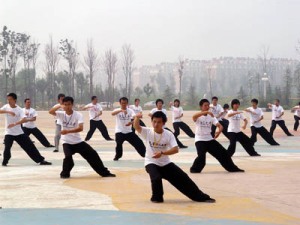 Like acupuncture(針灸), Tai Chi (太極拳) was known to improve blood circulation and stimulate the central nervous system. A new study now reported that adding Tai Chi to antidepressant therapy (such as escitalopram, Lexapro) can improve resilience, quality of life, and cognitive function in seniors with major depression.
Like acupuncture(針灸), Tai Chi (太極拳) was known to improve blood circulation and stimulate the central nervous system. A new study now reported that adding Tai Chi to antidepressant therapy (such as escitalopram, Lexapro) can improve resilience, quality of life, and cognitive function in seniors with major depression.
The study recruited 112 adults with major depression and treated them with an antidepressant (escitalopram) daily for 6 weeks. After 6 weeks of therapy, 70 patients who partially responded to escitalopram were randomized to practice Tai Chi or receive health education, in addition to the antidepressant.
Both Tai Chi and health education patients showed similar improvement in the severity of depression. However, subjects in the Tai Chi group showed significantly greater improvement in resilience than did subjects in the health education group (70.2% vs 65.0%; P < .05).
Also, patients who practiced Tai Chi also demonstrated greater improvement in health-related quality of life and cognitive functions (memory and executive function) scores when compared to the patients in the health education group (80 versus 66 on the 26-Item short Form Health Survey, P<0.05 and 0.03 versus 0.4 errors in Stroop mean error scores, P<0.05). Lastly, C-reactive protein levels were also improved in the Tai Chi group.
Since fewer than half of elderly depressed patients respond to first-line antidepressant, this study offers new hope to elderly patients with depression disorder.
Please visit http://healthreason.com for more health related articles.
Source: New Clinical Drug Evaluation Unit (NCDEU) 50th Anniversary Meeting: Abstract 5, Session II. Presented June 16, 2010.





